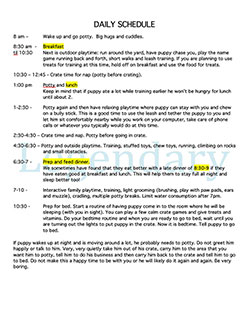

When you're transitioning from a stricter routine to a structured day with your dog, you'll want to watch for any signs of stress or anxiety.
#PUPPY DAILY SCHEDULE HOW TO#
Read more about how Marissa helped Mary Berry adjust to her new work schedule in the article "Preventing Separation Anxiety When You Work From Home." How to Introduce a Change in Routine to Your Dog Once Marissa changed to working away from home, Mary Berry had a tough time transitioning to being left at home without constant attention and company. Before joining our team, Mary Berry's owner Marissa worked regularly from home, and Mary Berry was used to that routine. One occasion of a daily routine backfiring was with another Preventive Vet team member's Mini-Goldendoodle puppy, Mary Berry. This means I have greater freedom to have a varied daily schedule and Sookie is able to cope with any unexpected changes. She's fed breakfast and dinner around the same time each day, but she doesn't come to bug me at a certain time if her bowl is still empty. I mix up her walks with playing fetch, tug, or a play date with a friend. If she didn't get a longer walk in the morning, that means she'll get one in the evening or we'll play with the flirt pole after work to burn some energy. While Sookie comes with me to work most of the time, some days I take her to dog daycare or leave her at home. Some days she gets a long walk in the morning and other days it's just a mini-walk before we go into work together.

Your dog needs structure in that you always return home, but not to become anxious if you don't walk in the door at exactly 5:30 pm.įor example, my dog Sookie has a structured day in that she is taken outside once we wake up, which is not at the same time every morning (I do like to get a couple of extra hours of sleep on the weekend). You want your dog to learn that they will be fed, but it might not always be at 7:00 am on the dot. This is where structure is more important than sticking to a strict routine. A Daily Structure is More Important than a Strict Routine for Your DogĪs your dog gets more comfortable in their new home, it's useful to mix up their routine every so often to prevent separation anxiety, and lessens both your and your dog's stress in case you can't make it home in time for a regular feeding or walk. However, as your new dog acclimates to their new home and as your puppy grows older, you want to avoid creating such a strict schedule that they don't know how to handle being left alone for longer than usual, a late feeding time, or missing their usual morning walk. You'll be able to anticipate when they'll most likely need to eliminate if they're on a regular feeding schedule, which helps you prevent indoor potty accidents (download this Puppy Potty Log for an easy way to track your pup's elimination schedule). You want to give them consistent outdoor potty opportunities, especially right after they wake up and after eating meals. Routine is also key to potty training success. They'll learn that they have access to water and consistent meals, regular exercise, mental enrichment, and that they have a safe place to be in their new home. When you first bring home a new dog, whether a young puppy or adopted dog, creating a routine can help them settle in during their adjustment period. When Routines are Useful: Puppies and New Dogsĭogs do well when they know what to expect from their environment, especially when it comes to safety and access to food. So when is a routine helpful versus a hindrance? Let's look at different reasons a routine might be a good choice for you and your dog, versus when you might want to mix it up. When working on separation anxiety with your certified dog trainer or board-certified veterinary behaviorist, modifying your pre-departure routines might be one of the first steps of treatment. Lots of unplanned events can pop up and you don't want your dog to become stressed if they don't get their walk at the normal time, or you won't arrive home until later than usual.įor dogs that suffer from separation anxiety or isolation distress, they are extremely aware of routine events that predict your leaving, which triggers their anxiety. But sometimes a strict adherence to a routine creates anxiety issues in your pup when all of a sudden they have a day where the routine gets thrown out the window. You might have heard that keeping your dog on a daily routine helps with behavior and training - which is true in some cases.


 0 kommentar(er)
0 kommentar(er)
